
2012 Stamp Issues
5th Jan 2012 - Olympics and Paralympics Stamp Booklet
Tues 10th Jan 2012 - Roald Dahl
20th January 2012, year of the Dragon, Smilers Sheet.
Thurs 2nd Feb 2012- The House of Windsor
6th February - Diamond Jubilee
Thurs 23rd Feb 2012 - Britons of Distinction
Thurs 8th March 2012 - Classic Locomotives of Scotland
Tuesday 20th March 2012 - Comics
Tuesday 10th April 2012 - UK A-Z Part 2
Tues 15th May 2012 - Great British Fashion
Thurs 31st May 2012 - The Diamond Jubilee
Tues 19th June 2012 - Charles Dickens
Tues 27th July 2012 - Olympic Games Welcome
Wed 29th August 2012 - Paralympic Games Welcome
Thurs 27th Sept 2012 - Olympic & Paralympic Games Memories
Tues 16th Oct 2012 - Dinosaurs
Tues 30th Oct 2012 - Space Science
Tues 6th Nov 2012 - Christmas
Royal Mail, House of Windsor Issue 2012-02-02
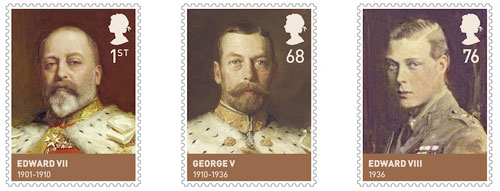
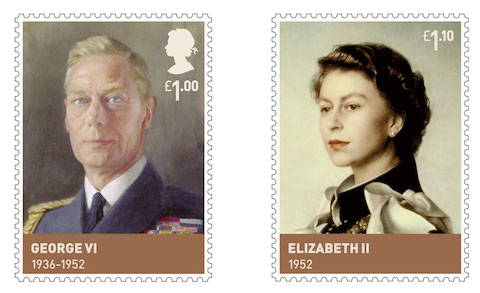
Issue Date - 2nd February 2012
The House of Windsor
This great Royal House began with the name Saxe-Coburg-Gotha, which was changed to Windsor by George V’s Royal Proclamation in 1917, in order to emphasise the Britishness of the Monarchy at the height of the First World War.
The House of Windsor has now reigned for over a century of great achievements and dramatic events. Despite the turbulence of two world wars and the constitutional crisis of the abdication, it has done so with enormous dignity. Royal Mail present this Special issue as Britain prepares to celebrate only the second ever Diamond Jubilee in history; the first being that of Queen Victoria, the great-great- Grandmother of Her Majesty The Queen.
Issue Products
Stamp SetThe Mint Stamps feature some of the best known portraits of the featured Monarchs together with the dates of each one's reign. |
  |
Miniature SheetThe miniature sheet focuses on achievements over the reign of The Windsors. It cintains four stamps not available on any other loation. Featured are: the Scott Antarctic Expedition, World War II, England’s World Cup victory of 1966 and the completion of the Channel Tunnel. It was designed by Atelier Works and printed by Cartor Security Printing, Meaucé, France using lithography. |
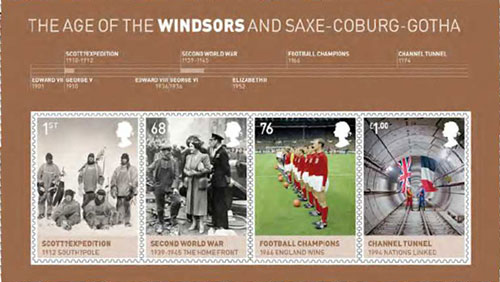 |
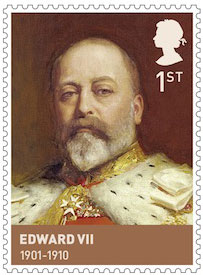 |
1st Class - Edward VII (1901 - 1910)Edward VII was the first British monarch of the House of Saxe-Coburg and Gotha, which was renamed the House of Windsor by his son, George V. During the widowhood of his mother, Queen Victoria, he was largely excluded from political power and came to personify the fashionable, leisured elite. |
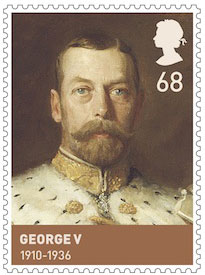 |
68p – George V (1910-1936)George was the first cousin of Tsar Nicholas II of Russia and Kaiser Wilhelm II of Germany. From 1877 until 1891 he served in the Royal Navy. On his father's death in 1910, he succeeded as King-Emperor of the British Empire. He was the only Emperor of India to be present at his own Delhi Durbar. |
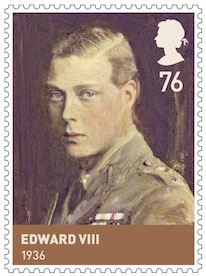 |
76p – Edward VIII (1936)Only months into Edward’s reign, he caused a constitutional crisis by proposing marriage to the American socialite Wallis Simpson, who had divorced her first husband and was seeking a divorce from her second. The prime ministers of the United Kingdom and the Dominions opposed the marriage, arguing that the people would never accept a divorced woman with two living ex-husbands as queen. Additionally, such a marriage would have conflicted with Edward's status as head of the Church of England, which opposed the remarriage of divorced people if their former spouses were still alive. Edward knew that Stanley Baldwin’s government would resign if the marriage went ahead, which could have dragged the King into a general election and ruined irreparably his status as a politically neutral constitutional monarch. Rather than give up Mrs. Simpson, Edward abdicated. He was succeeded by his younger brother Albert, who chose the regal name George VI. With a reign of 325 days, Edward was one of the shortest-reigning monarchs in British history. He was never crowned. |
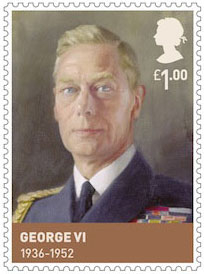 |
£1.00 – George VI (1936-1952)As the second son of King George V, he was not expected to inherit the throne and spent his early life in the shadow of his elder brother, Edward. He served in the Royal Navy during World War I, and after the war took on the usual round of public engagements. He married Lady Elizabeth Bowes-Lyon in 1923, and they had two daughters, Elizabeth and Margaret. |
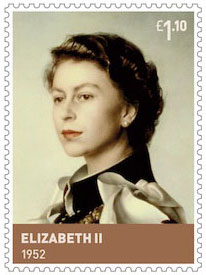 |
£1.10 – Elizabeth II (1952 -)Elizabeth II is the constitutional monarch of the United Kingdom, Canada, Australia, New Zealand, Jamaica, Barbados, the Bahamas, Grenada, Papua New Guinea, the Solomon Islands, Tuvalu, Saint Lucia, Saint Vincent and the Grenadines, Belize, Antigua and Barbuda, and Saint Kitts and Nevis. As Head of the Commonwealth, she is the figurehead of the 54-member Commonwealth of Nations; as the British monarch, she is the Supreme Governor of the Church of England. |
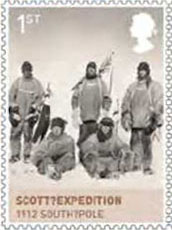 |
1st Class – Scott Expedition - 1912 South PoleCaptain Robert Falcon Scott of the Royal Navy led an expedition to the South Pole, which he and his four-man team reached on 17 January 1912, only to find that they had been beaten by a Norwegian expedition 33 days previously. On their way back to camp, through appalling blizzards, they were assailed by exhaustion, malnutrition and frostbite, and all sadly perished. The stamp marks the centenary of Scott’s team reaching the South Pole in one of the most famous expeditions in British history. |
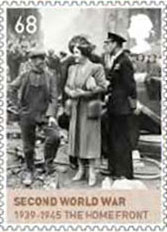 |
68p - Second World War - 1939 - 1945 The Home FrontThe Royal Family was tireless in its efforts to maintain domestic morale throughout the Second World War, especially during the Battle of Britain and the Blitz in 1940–41. When Buckingham Palace was hit by the Luftwaffe on 13 September 1940, with two bombs exploding only 30 yards from the King, Queen Elizabeth the Queen Mother remarked that now “she could look the East End in the face”. Fittingly the stamp shows that Queen Mother during a tour of bomb-damaged London. |
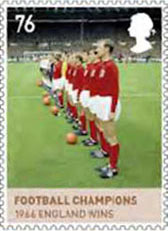 |
76p Football Champions 1966 England winOn 30 July 1966, in front of 93,000 spectators, the England football team made history at Wembley Stadium, becoming world champions after beating West Germany 4-2. After 90minutes the score was 2-2, but two extra-time goals from striker Geoff Hurst gave England victory on home soil. Queen Elizabeth II presented the jubilant players with the winners’ trophy. |
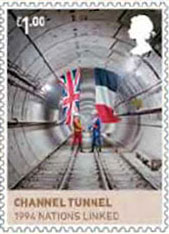 |
£1.00 Channel Tunnel- 1996 Nations LinkedThe two ends of the Channel Tunnel met in December 1990 and it was officially opened on 6 May 1994. On that day in Calais, Queen Elizabeth II and the French President François Mitterrand attended the inauguration after The Queen’s arrival in France on a Eurostar train. Later, she and Mitterrand travelled on a Le Shuttle train to an identical ceremony at Folkestone, Kent. The Channel Tunnel remains one of the outstanding engineering achievements of the 20th century, and this symbolic joining of nations is a fitting end to the Kings and Queen’s stamp series. |
The House of Windsor Miniature Sheet Technical Details
Feature |
Type/Detail |
Number of stamps |
Four |
Design |
Atelier Works |
Acknowledgements |
British Antarctic Expedition, photographed by Henry Bowers in January 1912 – (from left to right) Captain Oates, Lieutenant Bowers (sitting), Captain Scott, Dr Wilson (sitting) and Petty Officer Evans © Scott Polar Research Institute, University of Cambridge; royal tour of bomb-damaged London, October 1940 © Getty Images/Hulton Archive; England football team, Wembley 1966 © Gerry Cranham/Offside; Channel Tunnel, November 1990 © qaphotos.com/Alamy |
Stamp Format |
Portrait |
Sheet Size |
123mm x 70mm |
Printer |
Cartor Security Printing, Meaucé, France |
Print Process |
Lithography |
Number per Sheet |
25/50 |
Perforations |
14 x 14 |
Phosphor |
Bars as Approriate |
Gum |
PVA |
The Kings and Queens, House of Windsor Stamps Technical Details:
Feature |
Type/Detail |
Number of stamps |
Five |
Design |
Atelier Works |
Acknowledgements |
Edward VII, 1902, and George V, c.1911, by Sir Luke Fildes, The Royal Collection © 2011 Her Majesty Queen Elizabeth II; Edward VIII, c.1920, Reginald Grenville Eves © National Portrait Gallery, London; George VI, c.1949–52, Denis Quintin Fildes © reserved/The Royal Collection; Queen Elizabeth II (b.1926), 1954 (oil on canvas), Fishmongers’ Hall, London, UK/The Bridgeman Art Library, portrait by Pietro Annigoni, Camera Press London |
Stamp Format |
Portrait |
Stamp Size |
27mm x 37mm |
Printer |
Cartor Security Printing, Meaucé, France |
Print Process |
Lithography |
Number per Sheet |
25/50 |
Perforations |
14 x 14 |
Phosphor |
Bars as Approriate |
Gum |
PVA |

designed by KMcS, Dec 2009